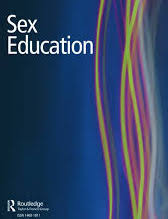Probing the politics of comprehensive sexuality education: ‘Universality’ versus ‘Cultural Sensitivity’: a Dutch–Bangladeshi collaboration on adolescent sexuality education
Abstract
As part of Western European development aid policy, comprehensive sexuality education (CSE) is increasingly promoted in resource-poor countries. This paper engages with CSE promotion in Bangladesh funded by the Dutch Government. It unpacks the ‘collaboration’ by looking at how a paradox is played out between the universal ideals underlying a broader transnational rights-approach and the intended cultural sensitivity by adapting CSE to the targeted context. Feminist scholarship on the ideological, moral and affective underpinnings of CSE is used to question this model’s implied universality and neutrality. The various negotiations, concerns and strategies of NGO-representatives as co-producers of sexuality knowledge in Bangladesh are focused upon. Analysis focuses on how a ‘speakable’, middle-class-oriented ‘proper’ sexuality is invented and managed through affect; how cultural insensitivity and secular normativity with respect to CSE are challenged in discussions concerned a rights-versus-health approach; and how a confident and knowledgeable adolescent or young person is imagined through the emancipatory project attributed to sexuality education. Rather than via equal collaboration, it is argued, adolescent sexuality education in these development aid settings is shaped by powerful transnational and local processes of Othering.
Introduction
As part of the development aid policies in various Western European countries, including the Netherlands, comprehensive sexuality education (CSE) has been promoted and implemented in many resource-poor countries. The impetus for this work is embedded in transnational commitments based on a Sexual and Reproductive Health Rights (SRHR) framework, as defined by organisations such as the United Nations Population Fund (UNPFA), the World Health Organisation (WHO) and the International Planned Parenthood Federation (IPPF). Within the transnational SRHR field, Western European nation-states invest heavily in sexuality education programmes in collaboration with local NGO partners in low-resource countries to improve the every-day lives of young people. While the SRHR-framework carries with it a universal promise, such programmes, often originally developed in donor countries, are supposed to be ‘adapted’ to the specific sociocultural-targeted context (Vanwesenbeeck et al. 2016) Despite the implicit universal ideal in SRHR discourse, cultural sensitivity appeals to diversity as another important virtue, suggesting a paradoxical relationship between the two. Building on critical feminist scholarship on dominant models of sexuality education, this paper focuses in on this paradox as played out by representatives of NGOs involved in setting up sexuality education programmes in Bangladesh. It probes the politics of knowledge and authority in the process of organising youth and adolescent sexuality education. The empirical data were collected as part of a transnational research project entitled Breaking the Shame: towards Improving Adolescent SRHR Education in Bangladesh funded by the Dutch Government.
The popularity and the effectiveness of CSE has been discussed by numerous scholars (Aggleton 2004, Farrelly, O’Brien, and Prain 2007, Goldman 2012, Haberland and Rogow 2015). Resolutions following the 2015 International Conference on Population and Development, repeatedly call on governments to provide CSE both in schools and at the community level (Haberland 2015). As defined by the IPPF, a leading advocate of SRHR, CSE ‘considers the various inter-related power dynamics that influence sexual choices and the resulting emotional, mental, physical and social impacts on each person’s development’ and emphasises ‘sexual expression, sexual fulfilment and pleasure’ as opposed to ‘methodologies that focus exclusively on reproductive aspects of adolescent sexuality’ (IPPF 2006). Within this definition, individual choice is seen as embedded within a societal field of power relations and the ability to express and fulfil sexual desires is celebrated. However, in some cases, rather than choice, the focus in on the ‘emotional’ well-being of the individual (e.g. UNESCO 2009). Nevertheless, the individual him/herself remains the main concern. This paper is divided into two sections. In the first of these, a theoretical discussion of CSE’s ideological, moral and affective underpinnings is discussed from a critical feminist perspective. This is followed by an empirical analysis of a stakeholders’ recent negotiations with and appropriations of a CSE-framework in Bangladesh.
The various interpretations of CSE within each country and the discrepancies between models and practice (Browes 2015, Vanwesenbeeck et al. 2016) notwithstanding, the Netherlands is generally labelled as exemplary in comparative research on the success and the extent of implementation of CSE (Lewis and Knijn 2003, Weaver, Smith, and Kippax 2005). This international depiction of the Netherlands as ‘progressive’ corresponds with its representation as liberal and tolerant in Dutch national public discourses on multiculturalism and sexuality, (Dudink 2017). Such scholarly and public sentiments are indicative of the post-colonial discursive space and power relations within which ‘collaborations’ in the field of sexuality education such as those between Dutch and Bangladeshi partners are set up. As gatekeepers of sexuality education in Bangladesh, the NGO-representatives referred to in this paper, receive funding, training and educational materials from, and work together with, Western donors to organise local sexuality education programmes. An analysis of their accounts, therefore, will help unpack the premises and implications of knowledge production in this transnational field of SRHR promotion. This analysis is a necessary step towards thinking about and creating the conditions for a more inclusive conversation about young people’s sexuality, especially when different cultures, histories and epistemes come together as in the case in Dutch–Bangladeshi collaborations on sexuality education.
